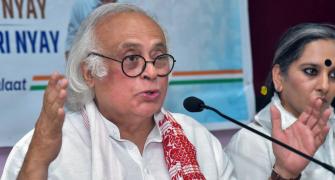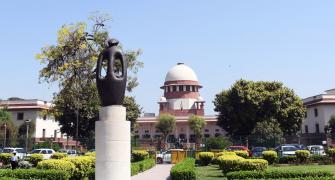India is poised to achieve an annual growth of around eight per cent in the near future even as it grapples with the challenges posed by globalisation, Deputy Chairman of the Planning Commission Montek Singh Ahluwalia has said.
"India is getting better day by day. There is huge amount of optimism about India. I have no doubt that the country is well positioned to accelerate from its present 6.5 per cent growth to around 8 per cent in the near future," he said delivering the 27th Jawaharlal Nehru Memorial Lecture on 'India in a Globalising World,' at the Chatham House in London on Wednesday evening.
"India's growth record during the period of globalisation has been much better than it was in the 1960s and 1970s, when economic growth slowed down to 3.5 per cent per year. Growth accelerated to around 5.7 per cent per year in the 1980s and 1990s and the economy is currently growing at about 6.5 per cent," he said.
"The present government has targeted a growth rate of between 7 and 8 per cent for the near future. Since population growth has slowed down from 2 per cent prior to 1990 to around 1.6 per cent at present, the acceleration in the growth of per capita incomes is obviously much better," Ahluwalia said.
The Planning Commission Deputy Chairman said India could emerge within ten years as an economy well on the way to achieving middle income status with a much broader middle class directly linked to the benefit of growth than is the case today. "In Nehru's memorable phrase, we will have brought about India's second tryst with destiny," he said.
Admitting that there was shortcoming in the field of infrastructure including power, road, airport and ports, Ahluwalia said the government was trying to improve them.
He said the new airports at New Delhi and Mumbai were expected to be ready by the Commonwealth Games in 2010.
Answering a question from Lord Meghnad Desai on labour reforms, Ahluwalia said even within the existing labour laws, some of the firms were doing very well.
He pointed out that international agencies and independent scholars agreed that India could aspire to achieve growth rates of eight per cent or so provided supportive steps were taken. "A much quoted recent study by Goldman Sachs identified India, Brazil, Russia and China as the set of large emerging market countries projected to grow rapidly over the next thirty years.
"Within the group, India's potential growth rate was projected to be the fastest - around 8 per cent per year - faster even than China which is currently, and has been for many years, the fastest growing economy but is expected to slow down in future," he said.
"According to this study, by 2040 India will become the third largest economy after the USA and China. This projection has been adopted by the US National Intelligence Council's 2020 report 'Mapping the Global Future'."
Commenting on the availability of capital, Montek said it depended on the rate of investment, which in turn was determined by the rate of savings.
"India's domestic savings rates are very respectable at 24 per cent of GDP, and are also rising, partly reflecting the age of composition of the population which is at the stage where the dependency ratio is falling. The weak spot is public savings, which is negative, though the latest figures show some improvement. In a globalising world, domestic savings can be supplemented by investment flows from abroad.
"India has only recently begun to attract foreign investment and there is considerable scope for expanding these flows."
Noting that government has set the target of raising foreign investment to three times its present level, Montek said it was not an impossible target since India at present attracted only about $5 billion of FDI compared with $60 billion for China.
"The present government is actively seeking to remove policy impediments to such flows and has already taken some steps in this area. With continuing improvement in domestic savings, and an increase in FDI from under one per cent of GDP to say 2.5 per cent, India can achieve the higher rates of investment needed to sustain eight per cent growth," he said.







